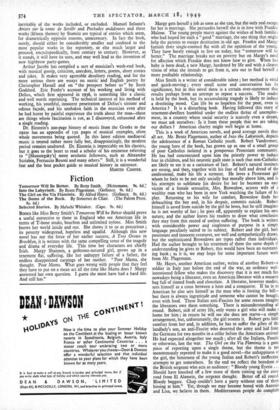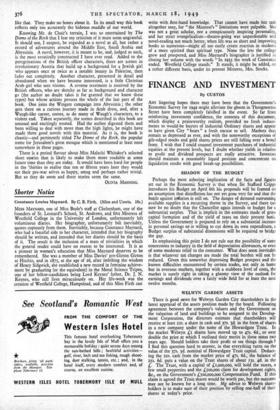Fiction
8s. 6d.)
Selected Stories. By Malachi Whitaker. (Cape. 9s. 6d.) Booics like Miss Betty Smith's Tomorrow Will be Better shquld prove a useful corrective to those in England who see American life in terms of T-bone steaks, bourbon and unlimited nylons. Miss Smith knows her world inside and out. She shows it to us as precarious ; its poverty widespread, hopeless and squalid. Although this new novel has not the force of her earlier success, A Tree Grows in Brooklyn, it is written with the same compelling sense of the tragedy and drama of everyday life. This time her characters are chiefly Irish. Margy Shannon, a gederous-natured girl, grows up in a tenement flat, suffering, like her unhappy failure of a father, the endless disappointed carpings of her mother. " Poor Mama, she thought. Poor Mama. What goes wrong with people that they feel they have to put on a mean act all the time like Mama does ? Margy answered her own question. I guess she must have had a hard life. And still has." Margy gets herself a job as soon as she can, but the only real escape for her is marriage. She persuades herself she is in love with Frankie Malone. The young people marry against the wishes of both families who had hoped for each a " good " marriage, the one thing that might help the parents to escape destitution in old age. Frankie and Margy furnish their single-roomed flat with all the optimism of the young. They have barely enough to live on today, but " tomorrow will be better." The marriage breaks not on poverty but on Margy's need for affection which Frankie does not know how to give. When her baby is born dead, a new Margy, hardened by life and with a clearer vision of what she intends to get from it, sets out to find herself a more profitable relationship.
Miss Smith is a writer of considerable talent ; her method is vivid and quick-moving ; every small scene and conversation has its significance, but in this novel there is a certain over-statement that results perhaps from an attempt to repeat a success. The reader is held by the book, but its accumulating tragedy is likely to induce a desolating mood. Can life be so hopeless for the poor, even in America ? It is a disturbing book. Having followed this story of tenement-dwellers humbled under the endless threat of unemploy- ment, in a country where social security is scarcely even a dream, we must ask ourselves : Is it from these people that we are taking our dollars ? American charity might well begin at home.
This is a week of American novels, and good average novels they all are. Mr. Bentz Plagemann, author of Into the Labyrinth, depicts the adolescence of a Roman Catholic youth. Robert Vandermeer, the young hero of the book, has grown up as one of a small group of poor Catholics isolated in a prosperous Protestant community. He has had concentrated upon him the priestly power to induce fear in children, and his neurotic guilt state is such that non-Catholics are likely to see it as a caricature of fact. Robert's natural instincts are strong, and they, together with his fear of hell and dread of the confessional, make his life a torment. He loves a Protestant girl whom he feels to be not only socially but morally above him, and in his attempts to sublimate his desire for her he becomes an easy victim of a female sensualist, Mrs. Brownlow, actress wife of a wealthy man who has been in new York watching the failure of his play. Returning to his wife for comfort, Brownlow finds her debauching the boy and, in his despair, commits suicide. Robert himself is saved from suicide by the girl he loves, but he still imagines he is not worthy of her ; he goes off, apparently to expiate his own nature, and the author leaves his readers to draw what conclusion they may from this record of useless suffering. The book is written with considerable power and singleness of purpose in a simple language peculiarly suited to its subject. Robert and the girl, both passionate and innocent creatures, are well and sympathetically drawn, but the sophisticated Brownlows are types rather than individuals. Had the author brought to his treatment of them the same depth of understanding he gives to Robert, this would have been an outstand- ing book ; as it is, we may hope for some important future work from Mr. Plagemann.
Mr. Hayes, another American author, writes of another Robert—a soldier in Italy just before the end of the war, an ordinary well- intentioned fellow who makes the discovery that it is not much fun nowadays being a liberator, even an American liberator with a musette bag full of tinned foods and chocolate. A liberator, however modest, sees himself as a cross between a hero and a conqueror. If he is an American he also sees himself as the man who is footing the bill— but there is always ingratitude and someone who cannot be bought, even with food. These Italian anti-Fascists for some reason imagine the liberators owe them something. There is misunderstanding all round. Robert, sick of army life, only wants a girl who will make home for him ; in return he will see she does not starve—a simpl: arrangement, but, unfortunately, the girl resents it. Robert gets Hui: comfort from her and, in addition, he has to suffer the gibes of the landlady's son, an anti-Fascist who deserted the army and hid front the Germans for two months in a cellar before the Americans arrived. He had expected altogether too much ; after all the Italians, Fascis: or otherwise, lost the war. The Girl on the Via Flaminia is a good piece of reporting upon a single theme, but the theme is too monotonously repeated to make it a good novel—the unhappiness at the girl, the bitterness of the young Italian and Robert's ineffectual attempts to get somewhere. In the end we reflect the boredom of the British sergeant who acts as audience : " Bloody young Eyetie Should have knocked off a few more of them coming up the coas: road from El Alamein, the sergeant thought. Better off all round. Bloody beggars. Chap couldn't have a party without one of them hissing at him." Yet, though we may become bored with Antonio and Lisa, we believe in them. Mediterranean people do complain
like that. They make no bones about it. In its small way this book reflects only too accurately the hideous muddle of our world.
Knowing Mr. de Chair's terrain, I was so entertained by The Dome of the Rock that I fear my criticism of it must seem ungrateful. It should not, I suspect, be regarded as a novel at all, but rather a record of adventures around the Middle East, Saudi Arabia and Abyssinia. A novel, however, it is meant to be, and, judged as such, is the most erratically constructed I have ever read. Added to the peregrinations of the British officer characters, there are scenes in revolutionary Austria that build up a background for a Jewish girl ' who appears once or twice as a notable beauty in Palestine, then fades out completely. Another character, presented in detail and abandoned when we have become interested, is a little Christian Arab girl who sees visions. A reverse treatment is received by the British officers, who are sketchy as far as background and character go (the author no doubt takes it for granted that we know these types) but whose actions possess the whole of the last part of the book. One joins the Wingate campaign into Abyssinia ; the other gets there on a curious journey made in Arab dress, and, after a Waugh-like career, comes, as do many of Waugh's characters, to a violent end. Taken separately, the scenes described in this book are unusual and excitingly treated. Had the author digested them and been willing to deal with more than the high lights, he might have made three good novels with this material. As it is, the book is chaotic—and pertinently titled The Dome of the Rock, the popular name for Jerusalem's great mosque which is mentioned at least once somewhere in these pages.
There is a period flavour about Miss Malachi Whitaker's selected short stories that is likely to make them more readable at some future time than they are today. It would have been hard for people in the 'thirties to realise that ten or fifteen years later they would see their pre-war selves as happy, smug and perhaps rather trivial. But so they do seem and these stories seem the same.
OLIVIA MANNING.







































 Previous page
Previous page